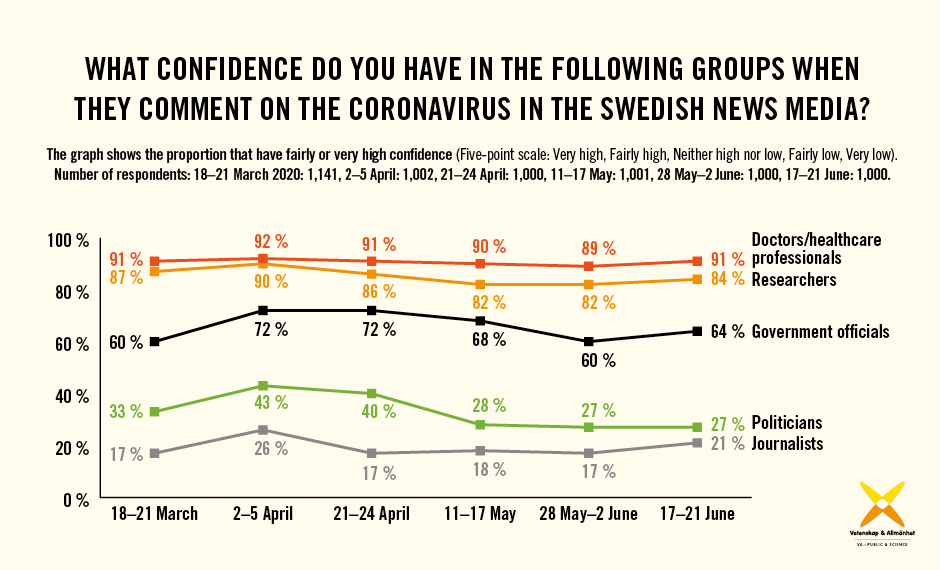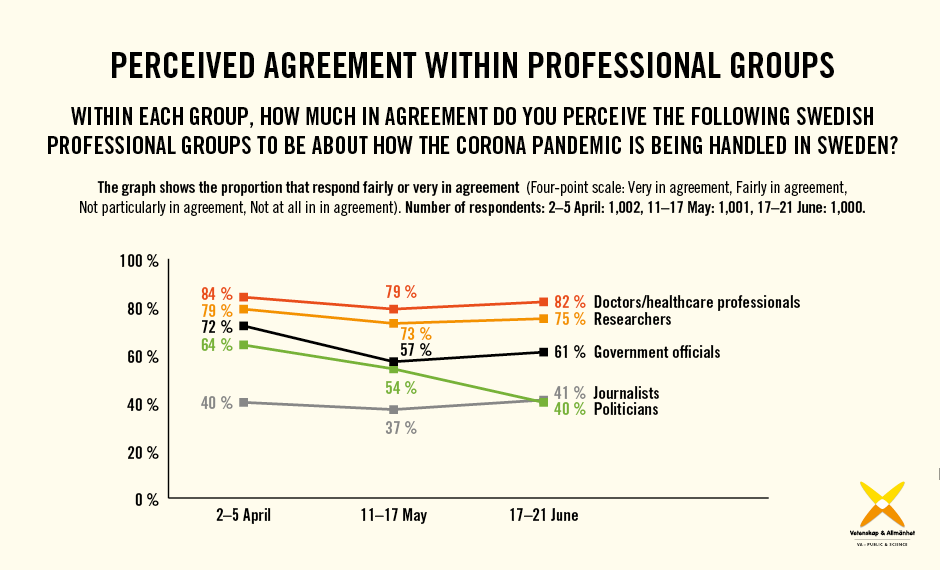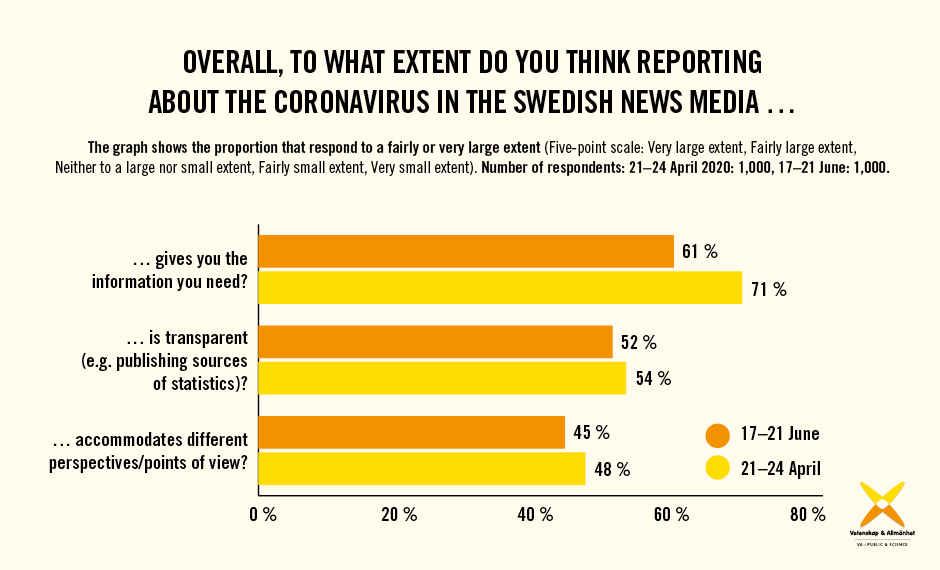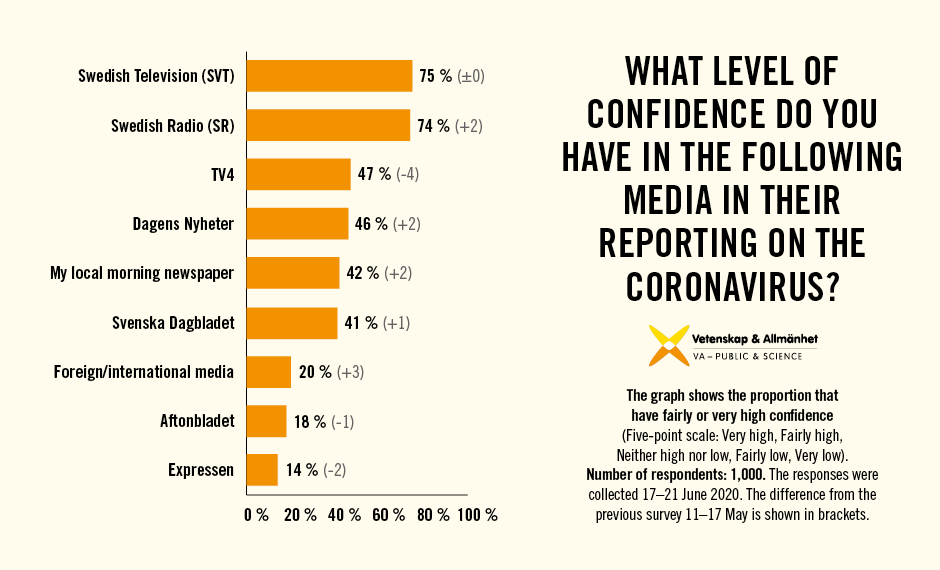A decreasing proportion of Swedes think that the media’s reporting on the coronavirus provides them with the information they need. Politicians who comment on the virus are perceived to be less in agreement than previously. These are the latest findings of a study being conducted by the Swedish non-profit organisation VA (Public & Science).

In collaboration with researchers from the Karolinska Institute and Södertörn University, VA (Public & Science) is conducting a study of how people are receiving and interpreting information about the coronavirus and the ongoing pandemic. Here, we present the findings from the sixth wave of the survey, which was undertaken between 17 and 21 June 2020.
Unchanged confidence in professional groups
The Swedish public’s confidence in various professional groups who comment on the coronavirus in the news media has remained largely unchanged since this was last measured at the end of May/beginning of June. Taking into consideration the six surveys that we have done to date, confidence in all professional groups is now back at around the same level as when the first survey was conducted in early March. In the second wave, in early April, we saw an overall increase in confidence, which then, during the month of May, has dropped back – first for journalists, then for politicians and lastly for government officials.
When it comes to confidence in politicians who comment on the coronavirus, we see a clear polarisation depending on which political party the respondents support. Supporters of the parties in government have a much greater confidence in politicians, compared to people who support the opposition parties. The proportion of Swedes that have fairly or very high confidence in politicians is greatest among supporters of the Social Democrats (46 percent) and supporters of the Centre Party and the Green Party respectively (both 43 percent). The lowest confidence can be seen among supporters of the Sweden Democrats (6 percent), Christian Democrats (10 percent) and the Moderates (16 percent).

Reduced agreement among politicians
Agreement among politicians has been perceived as steadily declining since the beginning of April, when we first asked the question. Now, four out of ten Swedes (40 percent) believe that politicians are fairly or very in agreement with each other when they talk about the coronavirus, compared to 64 percent in early April and 54 percent in mid-May. For other professional groups, no significant changes can be seen since this was last measured in May.
Researchers are perceived to be less in agreement compared to the first survey in early April, but no significant difference can be seen between May and June. People with a higher education perceive researchers as less in agreement compared to people that don’t have a higher education.

Fewer believe the media provides the information they need
Six out of ten (61 percent) feel, to a fairly or very large extent, that they receive the information they need about the coronavirus from the Swedish news media. This is a decrease of ten percentage points compared to when this was measured at the end of April. Men to a lesser extent than women consider that they receive the information they need (56 percent among men and 65 percent among women).
Roughly half (52 percent) of Swedes, to a fairly or very large extent, perceive the news reporting to be transparent and, for example, publish the sources of statistics. On the other hand, almost one in five (18 percent) considers that reporting is transparent to a fairly or very small extent. These respondents are predominantly men and supporters of the Swedish Democrats.
Just less than half of the Swedish public (45 percent) believes that the reporting accommodates different perspectives/points of view to a fairly or very large extent. Among Swedes who do not feel that different perspectives are accommodated, there is a greater proportion of men, supporters of the Christian Democrats and the Swedish Democrats, as well as people whose monthly salary is 42,000 SEK or more.

Confidence in the media remains unchanged
As seen in previous waves of the survey, Swedish Television (SVT) and Swedish Radio are the media in which citizens have the greatest confidence. Three out of four Swedes have fairly or very high confidence in the reporting on the coronavirus from SVT (75 percent) and Swedish Radio (74 percent). Almost half have fairly or very high confidence in the reporting from TV4 (47 percent), the newspaper Dagens Nyheter (46 percent), local morning newspapers (42 percent) and the newspaper Svenska Dagbladet (41 percent). Fewer have high confidence in the tabloids Aftonbladet (18 percent) and Expressen (14 percent). Twenty percent have high confidence in foreign media but international press also has the highest proportion of persons responding don’t know (26 percent). We do not see any statistically significant changes in the level of confidence in different media compared to the previous survey conducted in early April.

About the survey
The survey was conducted by Kantar Sifo and consisted of 1,000 interviews with a web panel based on random sampling. The interviews were conducted 17 –21 June. The results are weighted based on gender, age and region of residence.
In order to monitor the Swedish public’s news consumption, confidence in key professional groups and attitudes towards media reporting over time, we are conducting a number of studies during the course of the pandemic. During the autumn, we will undertake a content analysis of reporting on the coronavirus in the Swedish media in order to map any changes in reporting during different phases, and how this relates to public attitudes during the same time period.
The study is being conducted with the support of the Anne-Marie and Gustaf Anders Foundation for Media Research, LIF – the Swedish Association of the Pharmaceutical Industry, the Wenner-Gren Foundations and the Swedish Research Council.
Read more about VA’s study and the results of the first, second, third, fourth and fifth waves of the study.
